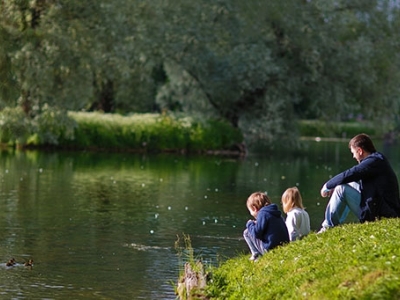
Five ways to improve mental health in your family (Part 2)
Christian psychologist Alexis Hudson explores some simple, proven strategies.
Last time, we saw that regularly practising gratitude and experiencing awe/wonder have proven mental health benefits. In this article, we will consider three more positive habits that can help our families to thrive.
Kindness
Kindness, expressed through looking after others, is built into Christian culture—in our church communities we do things like organising meal rosters, visiting those who are unwell and providing food and donations to those in need. Showing kindness towards others probably just feels like one of the basics of Christian living and may not be something you have considered as a way to look after your own mental health. Of course, doing something kind for someone can make them feel better. What you might find surprising (I certainly did) is that the giver benefits even more than the receiver. Showing kindness can improve our mood and increase our sense of connection with others. It really is a win–win.
Acts of kindness don’t always need to be grand gestures—they can be as simple as giving a compliment or picking up a dropped pencil for someone. You could introduce a challenge for everyone in your family to perform a random act of kindness during the week and report back at the end of the week. Or you could have a daily dinnertime sharing of something kind you did for someone else and something kind someone did for you (this is a good reminder that other people show kindness to us more than we might otherwise notice).
Mindfulness
You will have heard a lot about mindfulness in recent years, expressed in phrases such as ‘be present’ or ‘be more in the moment’. Practising mindfulness or learning to be more present has been shown to benefit us in lots of ways including better mood regulation, reduced stress and anxiety, and improved focus and working memory.
Our brains can get very busy, thinking about what’s next (I should really call and make a dentist appointment … Better get milk on the way home … Is it sports uniform tomorrow?) or things that have happened (I can’t believe I forgot I was rostered on yesterday … Did I say the right thing to my friend?). With all these things whizzing through our brains, it can be quite difficult to pay attention to the things happening right in front of us! Have you ever found yourself reading the same sentence ten times over, or realising you weren’t listening to what another person just said to you, or arriving at your destination not remembering the drive there?
Being mindful or present is not trying to empty your brain of all thoughts; it’s choosing to focus your attention on what you are doing right now, in the present moment. It’s intentionally noticing your surroundings and how you’re feeling in them.
If you have gone on holidays to somewhere new, you would likely do this instinctively—noticing the different sights, sounds and aromas—but in the hustle of everyday life, these things tend to blur into the background. That’s when we have to make an effort to act more like a toddler, as I say to my clients. If, for example, you have ever been on a walk or a train ride with a four-year-old, you were probably met with a lot of ‘Look at that … ’ and ‘Why is that …?’ as they noticed every little detail of their environment. Children are naturals at being ‘in the moment’; they’re probably not thinking about whether they will be painting or making playdough at preschool tomorrow.
There’s a helpful ‘grounding’ exercise you might have heard of where you count down through your senses (five things you can see, four things you can touch, three things you can hear, two things you can smell, one thing you can taste). Doing this with a child who is feeling overwhelmed helps calm them down, but it is also just a great thing to do while you’re walking outside together.
Exercise and movement
Traditionally, exercise has been thought of as way to improve and maintain physical health, which of course it does. More and more, it is being recognised as one of the most beneficial things for our mental health too. It’s something I check with all of my clients, because research shows that the effects of exercise are undeniably positive. Getting some exercise can improve sleep and academic performance and significantly improve mood. In fact, there are studies to show that exercising regularly can reduce the symptoms of depression as effectively as taking an anti-depressant medication.
I’ve found that when life gets busy and stressful, exercise is one of the first things people drop, as it’s seen as a bit of a luxury or something that you can re-start when life gets less hectic. The problem with that is that life doesn’t always slow down and there might never really be a good time to fit it in. I think it’s worth the effort of protecting time for exercise and if you think you don’t have time for it, or you feel too tired … this is probably when you need it most!
Kids often have physical activity built into their week. However, I see teenagers cutting their usual sporting commitments to have more study time. I understand that they want to prioritise their studies, but I encourage them to schedule study breaks that include some form of exercise or movement and never to drop physical movement out of their week completely. A twenty-minute walk around the block, some Pilates stretches, putting on music and dancing around the room, kicking a soccer ball around the yard—aim for easy and accessible.
As a parent, you might cherish some time for yourself to exercise. In addition to that, joining in with an activity your kids enjoy (shooting hoops, bike-riding, throwing a frisbee) is a great way to spend some time connecting with them while getting in some incidental exercise too.
How to get started
I hope that learning a little more about the value of these five practices has encouraged you to introduce or keep going with them in your family life. However just knowing what to do or having the best of intentions is not enough to make habits stick. If you have ever made a new year’s resolution, you’ll know what I mean.
To help these habits stick around, consistency is the key. It’s helpful to make these new habits part of a routine you already have—dinnertime sharing, prayers, even brushing your teeth could be a reminder to think of three things you’re thankful for. Talk about how and when you’re going to try the practices with your family—come up with ideas together and talk about the specifics. Have a way of tracking the habits with a chart on the fridge or a simple check-in with your family to share how it’s going. I have found my kids to be better at this than I am! They are quick to remind me if we haven’t shared our act of kindness at the dinner table.
Finally, start small and achievable. Life is busy, and taking on too much too soon can quickly put things in the ‘too hard basket’ or ‘when we have more time’ basket. I have explained why I think these five habits are well worth prioritising. Having gratitude, awe, kindness, mindfulness and exercise as part of your routine can strengthen your family bond and benefit your family’s mental and physical health. Which one could your family start with?
Recommended podcasts and videos:
The Happiness Lab (with Yale Professor Dr Laurie Santos)
The Science of Happiness (with Psychologist Dacher Keltner)
‘7 ways to be happier’ by Dr Laurie Santos
‘The new era of Positive Psychology’, TED talk by Martin Seligman
Recommended reading:
Authentic Happiness by Martin Seligman (Atria Books, 2004)
Flourish by Martin Seligman (William Heineman Australia, 2012)
'Kindness matters more than you think', Psychology Today
'Mindfulness and meditation: the benefits and challenges', Psychology Today
---
Alexis Hudson is a psychologist who has been working with adults and adolescents from all walks of life for just under 20 years. She loves empowering others to strive towards their best selves by helping them to develop skills and harness their strengths. She is a mum of three kids, and loves the way they bring out her adventurous side. Alexis and her family are part of a wonderful church community in the Sutherland Shire of Sydney.

A Godparent’s Handbook
This book gives Christians desiring to be good godparents the help they need to start well and keep on well as they assist their godchild to, God willing, develop into a fellow brother or sister in the faith.
For more articles from Growing Faith, subscribe to our monthly e-newsletter.
To hear about the latest books and resources from Youthworks Media, subscribe here.








